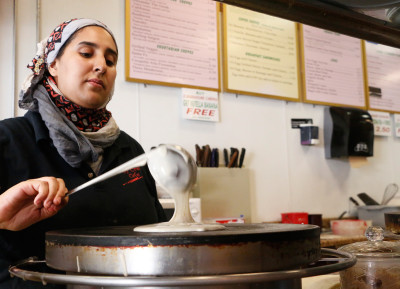
Catering to college students with tight budgets, the Collegiate Coupon Book offers deals and promotions straight from businesses both on campus and in the city. Distribution of the coupon books provides advertisements for restaurant and business owners, but the discounts also indicate which locations will help students save money.
Spiro Kouvlis, co-founder of UBurger, said the coupon book, in addition to social media efforts, has been effective for bringing students into the restaurant.
“The majority of our customers are college students,” Kouvlis said. “We use a lot of social media. We are posting a lot of pictures of our foods. In this tech age we are living in, everyone is on their social media apps, it’s a great way to spread the word about our company, or any business really.”
While many college students frequent the restaurant, Kouvlis has promoted the restaurant as a place for everyone for any day of the week. UBurger’s outreach methods, however, are not necessarily unique. Many area restaurants tailor their practices to keep prices down and students coming in.
Brahim Bendok, owner of Crispy Crêpes Café in Boston University’s South Campus, has made upgrades to his restaurant through advertising and changing up the menu to keep pricing low.
“85 percent of the business is with the students,” Bendok said. “We try to keep our cost low just by doing the shopping for ourselves … It saves 10 to 15 percent so we don’t have to charge that 15 percent to the customer. A lot of places will go online and will place orders through a supplier and that supplier will bring the food and ingredients to your place, but that comes at a price.”
The concept of the restaurant, Bendok said, is not found anywhere else near campus.
“We have a good concept,” Bendok said. “That’s the secret of staying longer. What we have is different than anybody else. We do French crêpes, we do breakfast, and we do Middle Eastern with shwarma kebabs, and this is something different.”
Rico DiFronzo, executive chef at the Union Oyster House and an instructor at Boston University’s School of Hospitality Administration, said that how restaurants operate depends on their client base.
“Sometime they’ll deal with the specials or the promotions or the things that attract the attention of the students, key items that [students] like to eat that an 80- or 90-year-old wouldn’t want to eat,” DiFronzo said. “They’ll tailor a menu to your likings. Basically, they’ll do things to help themselves, too. They’ll reduce the price of items to get you in the door. Then they’ll sell the other things like drinks, desserts,or appetizers.”
Several residents said they advocate restaurants’ decisions to offer lower menu prices, but sometimes that is not enough.
“A lot of us have 9-to-5, Monday through Friday jobs, but we still can’t afford to pay the prices at the restaurants,” said Sandy Boyce, 65, of Roxbury. “That’s why most will just stay home and cook or go to McDonald’s or Burger King. We want to go to fancy restaurants too, but we can’t afford it.”
Destiny Archambault, 25, of Brighton, said she supports participation in programs like Dine Out Boston that invite consumers into higher-end restaurants with a promise of a lower priced meal.
“They have Restaurant Week [now rebranded as Dine Out Boston] with the prefixed stuff which seems to be a little more affordable and it seems to be pretty popular,” she said. “There are a bunch of deals that go on. Restaurants have prefixed appetizer-entrée-dessert that they have set out at a cheaper price than it would be. That would be a great way to get people to go out to eat.”
Bob Ross, 28, of Brighton said it is important to find a balance between food quality and menu pricing.
“It would be great if food was cheaper,” he said. “Equally important to me is the quality of the food, so where it’s coming from, [and] minimizing processed and fatty fried foods … Around Brighton because there’s a lot of college kids, it’s definitely pretty affordable, but the more quality food is more expensive, and that’s what you are paying for.”
















































































































